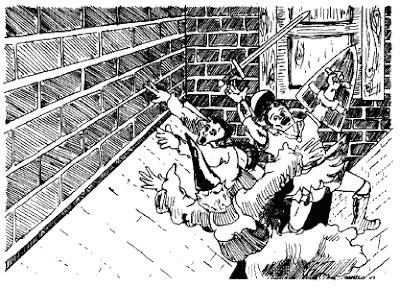High Lethality
 Old school roleplaying games, Dungeons & Dragons foremost among them, have a reputation for being deadly and absurdly so. Ask almost any roleplayer, young or old, about what distinguishes older editions of D&D from more contemporary ones and I'd wager that a good number of them would mention their supposed deadliness. I say "supposed," because I'm not convinced that older RPGs really are inherently deadlier than their descendants. At the same time, I do think there's something real behind this perception of high lethality; it's not simply a macho boast.
Old school roleplaying games, Dungeons & Dragons foremost among them, have a reputation for being deadly and absurdly so. Ask almost any roleplayer, young or old, about what distinguishes older editions of D&D from more contemporary ones and I'd wager that a good number of them would mention their supposed deadliness. I say "supposed," because I'm not convinced that older RPGs really are inherently deadlier than their descendants. At the same time, I do think there's something real behind this perception of high lethality; it's not simply a macho boast.Since returning to old school gaming shortly before I began this blog, I've refereed or played in a lot of different games, starting with my OD&D-derived Dwimmermount campaign. In nearly all of them, player characters died, with a RuneQuest campaign set in and around the Big Rubble being a stand-out in this regard (the campaign ended with a total party kill while fighting trolls). The level of lethality varied from game to game, though, with some (the aforementioned RQ, for instance) being quite lethal and others (such as my ongoing House of Worms campaign) being much less so.
Many things separate these games from one another in terms of their lethality. Their rules clearly play a significant role. RuneQuest in its first and second editions is famously deadly, while D&D, even in its oldest forms, is much more forgiving of characters above 1st level. The referee who ran each game likewise played an important role. I myself tend toward generosity; other referees of my acquaintance are far more unforgiving. That said, I think the single most important factor is the players themselves and how they approach the game. For example, in my House of Worms campaign, the players are exceptionally careful in determining their characters' actions and this has paid huge dividends. Since 2015, not a single character has permanently died, while my Pendragon campaign has seen innumerable deaths.
Permanently died. That's important to remember. From the very beginning, Dungeons & Dragons has included the means to restore dead characters to life, usually in the form of spells like raise dead or reincarnate or magic items like the rod of resurrection. AD&D, which some regard as the highest expression of Gygaxian D&D, explicitly includes gold piece costs for casting spells like raise dead in the event no player character can cast the spell himself. The cost? A mere 1000 gold pieces plus 500 per level of the caster, or 5500 gp if one employs a 9th-level cleric (the lowest level at which the spell is usable). This suggests to me that, while it's assumed that PC death is possible, AD&D also assumes that it should be reversible.
Given this, why do old school RPGs, especially old school D&D, have this reputation for high lethality? I think it's because, while character death isn't certain by any means, it's not only possible but unexpectedly so. The culture, for lack of a better word, surrounding old school RPGs, then and now, is that nothing is guaranteed. The dice, not the player, nor even the referee, determine what will happen and this is a good thing. Any "story" that emerges from play does so organically rather than as a result of intentional design. Thus, any character might fall prey to a pit trap or a venomous bite or just a lucky hit by a lowly orc. That's what it's like to play D&D.
That doesn't mean a dead character is necessarily gone forever. Many old school RPGs provide lots of means of overturning these setbacks – and setbacks, they are. I suspect that many players feel that character deaths must have meaning and hence should only happen for "good" reasons, not simply due to the result of a random roll. Similarly, the ability to reverse death is often seen as contributing to the meaningless of death. After all, if you can bring a character back with just the expenditure of a few thousand gold pieces – a pittance for even mid-level characters – death's sting is lessened considerably, if not eliminated entirely.
While I genuinely appreciate this perspective, it's clearly not one that Gary Gygax shared. If he had, why would he have included raise dead or the rod of resurrection? Just because death is possible and often without warning does not mean that it's the End. D&D is a fantasy game, after all, and the myths, legends, and literature on which it draws include numerous examples of heroes overcoming the power of Death itself. That's as much a part of D&D as save or die attacks and green devil faces.
Published on June 10, 2022 09:00
No comments have been added yet.
James Maliszewski's Blog
- James Maliszewski's profile
- 3 followers
James Maliszewski isn't a Goodreads Author
(yet),
but they
do have a blog,
so here are some recent posts imported from
their feed.



